 |
|---|
|
The 1975 Lombard regional election took place on 15 June 1975. The 2nd term of the Regional Council was chosen.
Contents

 |
|---|
|
The 1975 Lombard regional election took place on 15 June 1975. The 2nd term of the Regional Council was chosen.

Election was held under proportional representation with provincial constituencies where the largest remainder method with a Droop quota was used. To ensure more proportionality, remained votes and seats were transferred at regional level and calculated at-large.
Despite the huge jump made by the Communist Party, which gained nearly 7 point more than five years before and won the majority of votes in Milan, the Christian Democracy party remained the largest party and incumbent president Cesare Golfari was able to form a second center-left government with the support of the PSI, the PSDI and the PRI.
 | |||||
| Parties | Votes | % | Seats | +/- | |
|---|---|---|---|---|---|
| Christian Democracy | 2,182,347 | 37.48 | 32 | ||
| Italian Communist Party | 1,769,301 | 30.39 | 25 | ||
| Italian Socialist Party | 818,168 | 14.05 | 11 | ||
| Italian Democratic Socialist Party | 300,973 | 5.17 | 3 | ||
| Italian Social Movement | 263,621 | 4.53 | 3 | = | |
| Italian Republican Party | 179,508 | 3.08 | 2 | = | |
| Italian Liberal Party | 163,117 | 2.80 | 2 | ||
| Proletarian Democracy | 143,594 | 2.47 | 2 | = | |
| others | 1,452 | 0.02 | – | = | |
| Total parties | 5,822,081 | 100.00 | 80 | ||
| Invalid/blank votes | 217,896 | ||||
| Registered voters | 6,039,977 | 95.04 | |||
| Source: Ministry of the Interior – Results | |||||
| Province | DC | PCI | PSI | PSDI | MSI | PRI | PLI | DP | Total |
|---|---|---|---|---|---|---|---|---|---|
| Milan | 11 | 13 | 5 | 2 | 2 | 2 | 1 | 1 | 37 |
| Brescia | 5 | 2 | 1 | 1 | 1 | - | - | - | 10 |
| Bergamo | 5 | 2 | 1 | - | - | - | - | 1 | 9 |
| Como | 3 | 2 | 1 | - | - | - | 1 | - | 7 |
| Varese | 3 | 2 | 1 | - | - | - | - | - | 6 |
| Pavia | 2 | 2 | 1 | - | - | - | - | - | 5 |
| Mantua | 1 | 1 | 1 | - | - | - | - | - | 3 |
| Cremona | 1 | 1 | - | - | - | - | - | - | 2 |
| Sondrio | 1 | - | - | - | - | - | - | - | 1 |
| Total | 32 | 25 | 11 | 3 | 3 | 2 | 2 | 2 | 80 |

The additional-member system (AMS) is a mixed electoral system under which most representatives are elected in single-member districts (SMDs), and the other "additional members" are elected to make the seat distribution in the chamber more proportional to the way votes are cast for party lists. It is distinct from parallel voting in that the "additional member" seats are awarded to parties taking into account seats won in SMDs, which is not done under parallel voting.
The D'Hondt method, also called the Jefferson method or the greatest divisors method, is an apportionment method for allocating seats in parliaments among federal states, or in proportional representation among political parties. It belongs to the class of highest-averages methods.
At a national level, Greece holds elections for its legislature, the Hellenic Parliament.

Parliamentary elections were held in Hungary on 9 April 2006, with a second round of voting in 110 of the 176 single-member constituencies on 23 April. The Hungarian Socialist Party (MSZP) emerged as the largest party in the National Assembly with 186 of the 386 seats, and continued the coalition government with the Alliance of Free Democrats (SZDSZ). It marked the first time a government had been re-elected since the end of Communist rule. To date, this is the most recent national election in Hungary not won by Fidesz-KDNP, and the last in which the victorious party did not win a two-thirds supermajority in parliament.

The Sardinian regional election of 2004 took place on 12–13 June 2004.
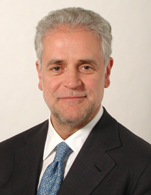
The 2005 Lombard regional election took place on 3–4 April 2005. The 8th term of the Regional Council was chosen. Roberto Formigoni was re-elected for the third time in a row President, defeating Riccardo Sarfatti.

The 1990 Lombard regional election took place on 6 and 7 May 1990. The 5th term of the Regional Council was chosen.

The 1985 Lombard regional election took place on 12 May 1985. The 4th term of the Regional Council was chosen.

The 1980 Lombard regional election took place on 8 June 1980. The 3rd term of the Regional Council was chosen.

The 1970 Lombard regional election took place on 7–8 June 1970. It was the first-ever regional election.

The Sardinian regional election of 1994 took place on 12 and 26 June 1994.
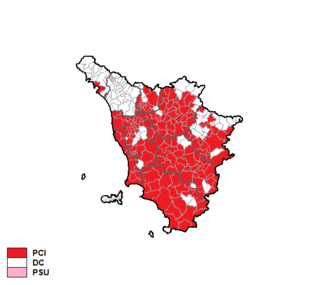
The Tuscan regional election of 1970 took place on 7–8 June 1970. It was the first-ever regional election.
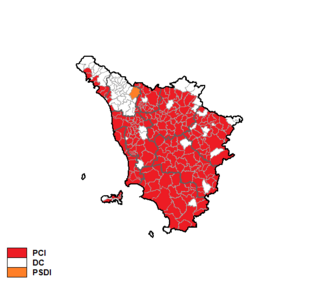
The Tuscan regional election of 1975 took place on 15 June 1975.
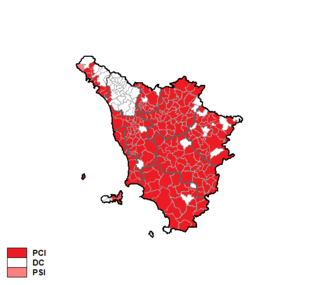
Tuscan regional election of 1985 took place on 12 May 1985.

The Tuscan regional election of 1990 took place on 6 and 7 May 1990.

The Sardinian regional election of 2009 took place on 15–16 February 2009.
The German federal election system regulates the election of the members of the national parliament, called the Bundestag. According to the principles governing the elections laws, set down in Art. 38 of the German Basic Law, elections are to be universal, direct, free, equal, and secret. Furthermore, the German Basic Law stipulates that Bundestag elections are to take place every four years and that one can vote, and be elected, upon reaching the age of 18. All other stipulations for the federal elections are regulated by the Federal Electoral Act. Elections always take place on a Sunday. Mail votes are possible upon application.
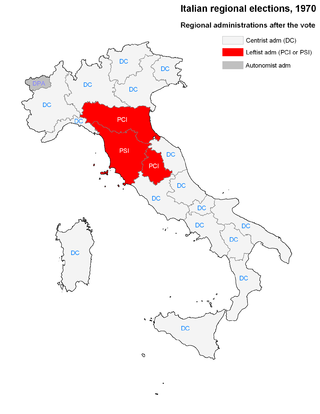
The Italian regional elections of 1970 were held on 7 and 8 June. Even if the regional system was conceived by the Italian Constitution in 1948, the five autonomous regions were the sole to be immediately established. The fifteen ordinary regions were indeed created in 1970 with the first elections.

The Italian regional elections of 1975 were held on 15 and 16 June. The fifteen ordinary regions, created in 1970, elected their second assemblies. Following the 1971 census, Piedmont, Veneto and Lazio had ten more seats each.
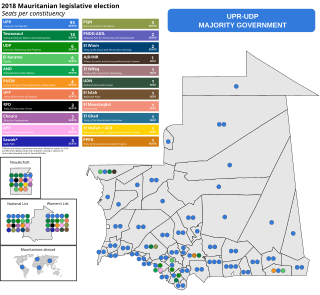
Parliamentary elections was held in Mauritania in September 2018; the first round took place on 1 September, with a second round held on 15 September. At the national level, elections were held in 157 constituencies, each electing one member to the National Assembly. Elections were also held in 13 regional councils and 219 municipalities.